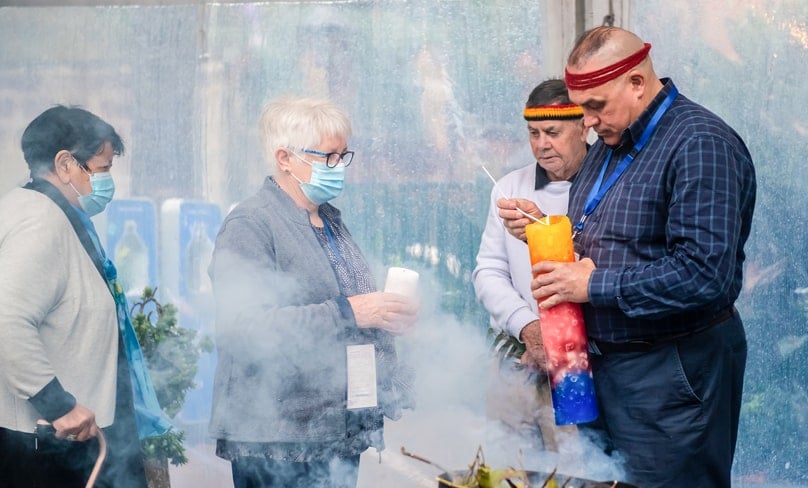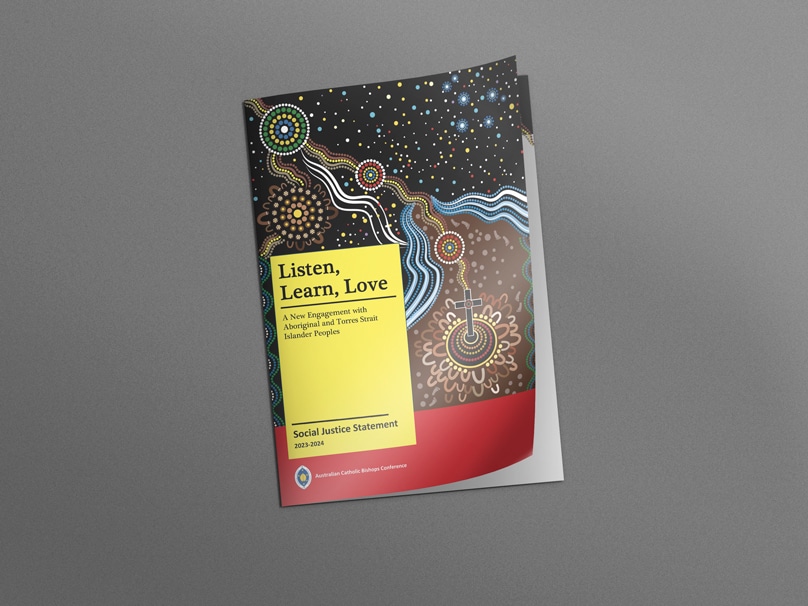
The Australian Catholic Bishops Conference has called for a “new engagement” with Aboriginal and Torres Strait Islander people to put the church “at the forefront of a new era in Australia’s public life” in its 2023 social justice statement on indigenous Australians.
The statement, entitled Listen, Learn, Love: A New Engagement with Aboriginal and Torres Strait Islander Peoples, does not formally tell Catholics to vote Yes at the forthcoming Voice to Parliament referendum.
But it does give broad support to the Yes case and features a call to vote Yes from the National Aboriginal and Torres Strait Islander Catholic Council.
In a subsection entitled “Supporting the Voice is a Start,” the statement says that, “We in NATSICC know there are criticisms, even from Aboriginal people, but most Aboriginal and Torres Strait Islander people support the referendum.”
“Just as the churches strongly supported the 1967 referendum, we hope that Catholics, along with other people of faith, will support the Yes campaign … We, NATSICC, feel that the referendum is too important to fail. The consequences for our people and the whole nation would be devastating.”
The statement, launched on 17 August by Bishop Vincent Long of Parramatta, foregrounds the views of NATSICC, and then gives a reply from the ACBC.
The bishops, in their reply, said they “will not tell Catholics or their fellow Australians how to vote in the referendum” but instead encourage people to seek out information from indigenous people.
“Those who propose the referendum do not seek to divide our country, and none of us should accept divisive behaviour during the referendum campaign,” the bishops’ reply reads.
Archbishop Timothy Costelloe SDB, president of the ACBC, said the heart of the statement was “a new engagement with Aboriginal and Torres Strait Islander peoples” after “much listening.”
The archbishop said indigenous people needed to be “welcomed from the margins into the centre, so that they can lead the discussions about change and implementation about actions, to bring about healing and justice.”
“Change is necessary if the hope and aspirations of Aboriginal and Torres Strait Islander people are to be realised. We can be at the forefront of a new era in Australia’s public life,” he said.
Dr Lisa Buxton, executive officer of the Archdiocese of Sydney’s Aboriginal Catholic Ministry, said at the launch that, “We should be deepening our understanding of Aboriginal and Torres Strait Islander spirituality, and our expression of spirit within our Catholic tradition.
“This recognition needs to go beyond reconciliation and NAIDOC week.”
She also called for an increased number of “appropriately resourced” Aboriginal Catholic ministries, of which there are current 14 nationwide for an estimated 135,000 indigenous Catholics.

The document’s structure was inspired by the church’s ongoing synodal readjustment, Bishop Long said at the statement’s launch.
“Listening and learning is also an essential part of the synodal approach which the Holy Father is inviting us to embrace. We tried to keep this in mind, too, as we wrote this statement,” Bishop Long said.
“We need to listen with deep respect and learn from them about what needs to be done to improve their situations. We need to walk with them, day by day, and work with them to bring about change for the better – for their people and for all of us,” he said.
“Strengthening our relationship with our First Peoples is integral and indeed critical to the strengthening of the whole nation.”
The ACBC endorsed the Uluru Statement from the Heart in 2021, and the Fifth Plenary Council of Australia followed in 2022.
The Voice to Parliament is one of three recommendations from the Uluru Statement, alongside a makarrata or “truth-telling” and a treaty.
The Uluru Statement describes Aboriginal and Torres Strait Islander sovereignty over the land as “a spiritual notion” that “has never been ceded or extinguished, and co-exists with the sovereignty of the Crown.”
But Shadow Minister for Indigenous Australians, Jacinta Nampijinpa Price, rejects the spiritual foundation of the Voice to Parliament.
Speaking to The Catholic Weekly by email, Price said that, “Advocates for the Voice will try to use spiritual imagery, but this is not a spiritual notion.”
“It is a purely political proposal that has no basis in Aboriginal culture or traditional customs. It doesn’t respect or flow from leadership structures traditionally used in Aboriginal communities.”
“The Voice is an inherently divisive proposal, simply by putting it forward the government began to divide us. No matter the outcome, Australia will need time to heal.
“We should not be bullied into voting Yes or held to ransom because a few will protest about not getting their way.
“We must vote for what is best for all Australians, and I believe saying No and remaining equal before the law is what is best for us all.”
